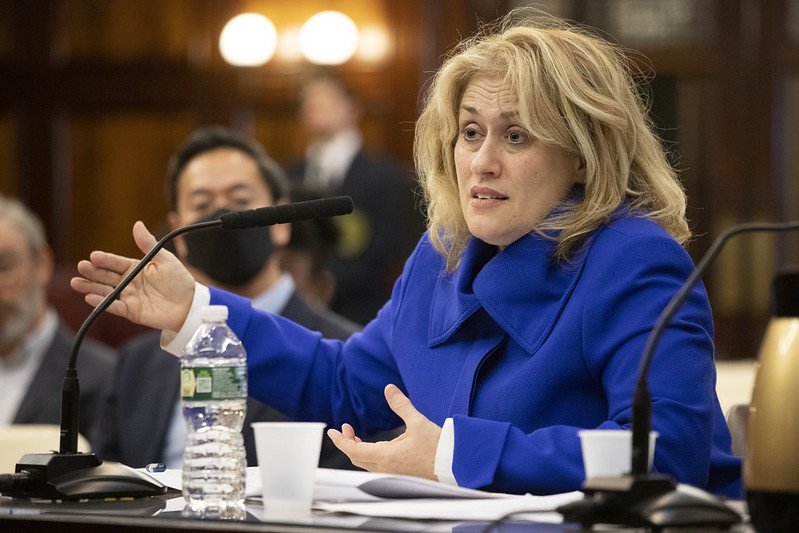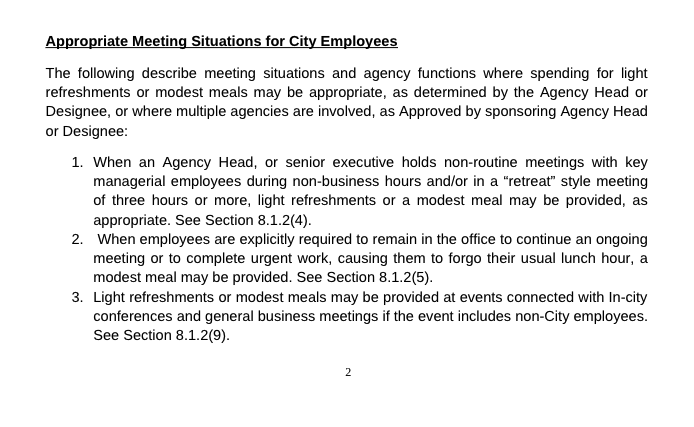NYC Campaign Finance Board demands transparency from everyone — but itself
July 17, 2023, 5:31 a.m.
A Gothamist investigation reveals an agency plagued by mismanagement and questionable spending.

In May, the New York City Campaign Finance Board announced that Beth Rotman, its executive director, had resigned after a seven-month tenure, citing the “need to move to care for an ailing family member.”
The statement did not tell the full story.
Following a Gothamist investigation, the board's chair acknowledged that Rotman did not resign voluntarily as the agency publicly announced. Instead, she was asked to step aside following a board investigation into concerns about her management.
“On May 13, Ms. Rotman was informed the Board had lost confidence in her leadership of the agency and requested her resignation effective immediately,” Frederick Schaffer, the board's chair, said in a statement.
In the two months since announcing Rotman's departure, internal documents obtained by Gothamist along with interviews with more than 10 current and former colleagues show that the agency, which prides itself on accountability and transparency, is facing an internal integrity issue of its own making related to Rotman’s exit.
Rotman’s short tenure at the CFB, which is considered the nation's gold standard for distributing and overseeing taxpayer dollars to the city’s political campaigns, was marred by concerns over her professionalism, management style and what colleagues called wasteful spending, internal records show. Gothamist reviewed memos, invoices, receipts, expense statements and resignation letters from the past year through a Freedom of Information Act request.
While Rotman’s time leading the agency was brief, the fallout included two senior staff members who resigned during her tenure, citing concerns about her leadership, according to resignation letters obtained by Gothamist, as well as thousands of dollars in high-end office furniture and personal expenses, like food delivery and restaurant tabs, that did not conform with city policy.
In two written statements to Gothamist, Rotman did not admit any wrongdoing, and instead touted her credentials and noted that she is still a “valued adviser” to the agency.
- heading
- Rotman's responses
- image
- image
- None
- caption
- body
“Our role is to keep people trusting us and to keep faith in the system so I certainly would never want to do anything but support this and do not believe that I have done so,” said Rotman. “I regret submitting anything without the necessary detail to demonstrate why expenses fell within exceptions.”
Although the board said it “lost confidence” in Rotman over her conduct, the CFB continued to keep her on the payroll as a special assistant to Schaffer, the board chair, and the interim executive director, at her existing $250,000 annual salary through July 14. It was part of a separation agreement to prevent Rotman from suing the city, according to a signed copy of the document obtained by Gothamist.

An agency unlike others
The CFB was formed in response to a series of high-profile corruption scandals that rocked the administration of Mayor Ed Koch. The agency and its responsibilities have grown significantly over the past 35 years, and it has added larger voter education and outreach responsibilities to its mandate, along with stewardship of the matching funds program.
“What was envisioned early on was a much smaller operation than we established,” said the CFB's founding Executive Director Nicole Gordon, who served there for 18 years.
“Now, it's even bigger, of course,” said Gordon, who is now a distinguished lecturer and faculty director of the executive masters in public administration program at Baruch College’s Marxe School of Public and International Affairs.
In 2021, the agency oversaw the largest municipal election cycle in its history and awarded $126.9 million in public funds to 308 candidates, matching nearly $18.3 million in contributions from New Yorkers. The program offers a dollar-for-dollar match for contributions of up to $175-$250 (depending on the city office sought) at a rate of $8 to $1.
But unlike other city agencies, the CFB is not overseen by the mayor’s office. Instead, it is governed by a five-member board. According to staff, board members rarely interact personally with members of the agency beyond the executive director and general counsel.
In her statement to Gothamist, Rotman said she worked closely with the board. “There was plenty of oversight and information sharing,” she wrote.
"There is a significant mismatch in values regarding risk management, internal controls, and transparent communication between the CFB and myself."
Mario Rocvil Jr., assistant director of operations at the CFB.
The gold standard
The CFB's role as a standard-bearer for transparency and gatekeeper against bad actors inappropriately using taxpayer money for political runs came to a crescendo earlier this month when the Manhattan district attorney’s office cited the importance of the CFB in upholding the city’s democracy after six people who raised money for Mayor Eric Adams' 2021 mayoral bid were charged in a straw donor scheme.
“When the integrity of that program is corrupted, all New Yorkers suffer,” Manhattan DA Alvin Bragg said in a statement at the time.
Yet when it came to the agency’s internal finances, records indicate that Rotman — who had previously worked at the CFB in a different capacity nearly two decades ago — was far more relaxed about her spending habits.
- heading
- Rotman's return
- image
- image
- None
- caption
- body
In September 2022, the CFB announced Rotman would be returning to lead the agency the following month, just shortly after the retirement of its second-ever Executive Director Amy Loprest, who held the position for 16 years. Rotman had previously served the board from 2003 to at least 2006 as the agency’s deputy general counsel.
At the start of her tenure leading the CFB, Rotman was issued a U.S. Bank Mastercard to be used exclusively for purchases made on behalf of the city. Last December, she signed a standard document that stipulated what purchases were permissible, like certain meal reimbursements with non-city staff or retreat style meetings. Personal expenses are not permitted.
Credit card statements show Rotman used the agency credit card to pay for subscriptions to The New Yorker, The Atlantic and The New York Times, along with samples of five different shades of blue paint from HomeDepot: Adirondack Blue, NYPD Blue, Charcoal Blue, Sophisticated Teal and Crater Lake Matte.
In early February, a fraud alert was placed on Rotman’s card and agency staff told her to refrain from using it, according to internal emails obtained by Gothamist.
“Most likely, a new card will need to be issued,” Daphne Colon, the CFB's director of staff support services, wrote in an email to Rotman. “We will need to revisit security protocols for this card with you.”
Mario Rocvil Jr., the assistant director of operations who managed the CFB's internal finances, was copied on the email exchange.
Rotman responded, asking Colon to schedule a meeting with her and her special assistant, Sandy Ma.
“I had a CT pcard (sic) for years with no issues,” Rotman also wrote, referencing an earlier position she held as executive director of Connecticut’s Citizens’ Election Program, a branch of the state’s Elections Enforcement Commission.
After Rotman resigned from the executive director post, Ma sent a memo to the agency’s legal department about “Beth Roman’s P-card status.”
“From my recollection, the charges to the P-Card flagged for fraud related to purchases from retailers which did not appear to be for the benefit of the CFB,” Ma wrote in the memo obtained through a FOIL request.
Ma wrote that she spoke with Rocvil and Colon about how to limit Rotman’s use of the card.
“I let Rocvil and Colon know that I would discuss with Rotman her P-Card use, which I did over multiple difficult verbal conversations,” Ma wrote.
Additional records show staff tried on more than one occasion to rein in Rotman’s spending.
In a March memo, Rocvil reviewed 40 receipts totaling $2,606.94. He said the CFB would only reimburse Rotman for four receipts — worth $229.03 — because those clearly indicated purchases for agency-related expenses.
Rocvil wrote that 12 of the receipts would not qualify given they did not meet the city’s criteria for when an agency head can be reimbursed for meals. The receipts included dining at Serafina, Benares and Le Pain Quotidien, five Uber Eats deliveries, and even a purchase for “flower, coffee and fruits.”
Two of the deliveries — one UberEats order for Zucker’s bagels and smoked fish and another from Spice Union Square — were made on weekends. Another reimbursement request for $29 from the Westside Market included a note that Rotman, “shared mandarins with office staff.”
Rocvil, who previously served as a fraud investigator at the city’s Department of Investigation, included several sections from the city comptroller’s directives that govern spending by city employees. He underscored for Rotman what meetings and meals were eligible for reimbursements and which were not.

He also noted that the balance of the 24 receipts, which totaled more than $1,700 and included more meals, a Metrocard and an unspecified purchase at the grocery store Key Food, required justification memos specifying how each of the purchases related to CFB business.
Rocvil declined to comment for this story.
‘Mismatch in values’
On March 27, two weeks after Rocvil sent Rotman the finance memo, he left the agency. His resignation letter was blunt, underscoring the tumultuous time under Rotman.
“After careful consideration, I have come to the realization that there is a significant mismatch in values regarding risk management, internal controls, and transparent communication between the CFB and myself,” wrote Rocvil, who added that he had spent much of his year and three months at the agency addressing existing “systemic weaknesses in processes that have been long-standing at the CFB.”
A month after Rocvil departed, the agency’s general counsel, Bethany Perskie, also resigned after 12 years at the CFB. Perskie’s departure set off alarm bells for the board members, according to CFB staff familiar with their thinking.
In her resignation letter,Perskie said she was committed to the agency’s mission. “However, over the past six months, it has become apparent that the values and priorities of the agency’s current executive leadership do not align with my own,” she wrote.
Perskie gave notice on April 26 and wrote a formal resignation letter dated May 12, the day before the Board told Rotman to resign.
Perskie declined Gothamist’s request for additional comments.
An office facelift
As city agencies faced looming budget cuts threatening services, expense records show that Rotman spent nearly $40,000 of taxpayer money between last October and this March to spruce up her personal office and create a new staff lounge.
She purchased a $2,687 “executive chair” for her office from MillerKnoll and a $370 Dyson Wireless vacuum cleaner — which the agency said is currently missing. Rotman did not respond to a question about the location of the pricy appliance.
The agency listed those purchases along with $15,000 in other expenditures Rotman made for her executive office, which included a $2,235 Eames executive desk, a $3,350 on a Turkish kilim rug, a $3,418 sofa, a $2,695 tan Egg chair and $575 for a side table, along with $10,000 for “site visit survey, consultation, drawing work” to the firm Architecture Work Office and $2,762 to Green Shareen Design for “Schematic Design of Office.”
While the city slowly emerged from the pandemic, one of Rotman’s first priorities when she rejoined the CFB this past fall after serving as deputy general counsel 16 years ago was to create a staff lounge, converting unused storage space into what she said was, “co-working spaces to get people back in the office.”
To outfit the space, Rotman spent $21,763 on furniture and design services, according to invoices, receipts and credit card statements obtained by Gothamist through a FOIL request. The space included a tan leather couch, leather swivel bar stools and high-top tables, new paint and lighting, and even pillows embroidered with the agency's initials: CFB.
In a statement, Rotman said she worked with an organizational psychologist on the project.
“A major initial focus was on building a stronger CFB culture because as the saying goes culture eats strategy for breakfast,” Rotman told Gothamist in a lengthy written response.
She called the co-working lounge, “a so-called micro purchase.” It was below the $100,000 threshold that required review by the city comptroller’s office.
The decision to spend so much on office furniture struck a nerve with many staffers who felt the expenditures violated the ethos of the agency — and possibly city policy, too.
“As an agency, the culture is very by-the-books and rule-following because of the oversight work we do,” said a senior staff member at the agency who requested anonymity because they were not authorized to speak on the agency’s behalf.
Schaffer said the board’s investigation of Rotman’s conduct had prompted them to change the agency’s expense policy for the executive director, limiting that person’s spending authority without authorization from the board’s counsel.
Unlike the general counsel, the board’s counsel does not report to the executive director and only reports to the board.
“The Board takes its oversight duties seriously. Like other governing boards in both public and private sectors, it carefully monitors the overall work of the agency: responsibility for the routine day-to-day management rests with the executive director and top-level staff,” said Schaffer, the current board chair, in a statement.
Board spokesperson Tim Hunter said the CFB planned to take steps to alert board members sooner about future internal complaints regarding the executive director’s conduct, including reminding staff how to file whistleblower complaints with the Department of Investigation.
In her statement, Rotman said she was trying to change a “broken system.”
“The people who drive real change take risks, challenge the entrenched norms and outdated practices that hinder progress, and start trying to move mountains,” Rotman wrote. “That is what I was doing at the CFB, an agency that needs internal transformation to serve NYC residents as they deserve.”